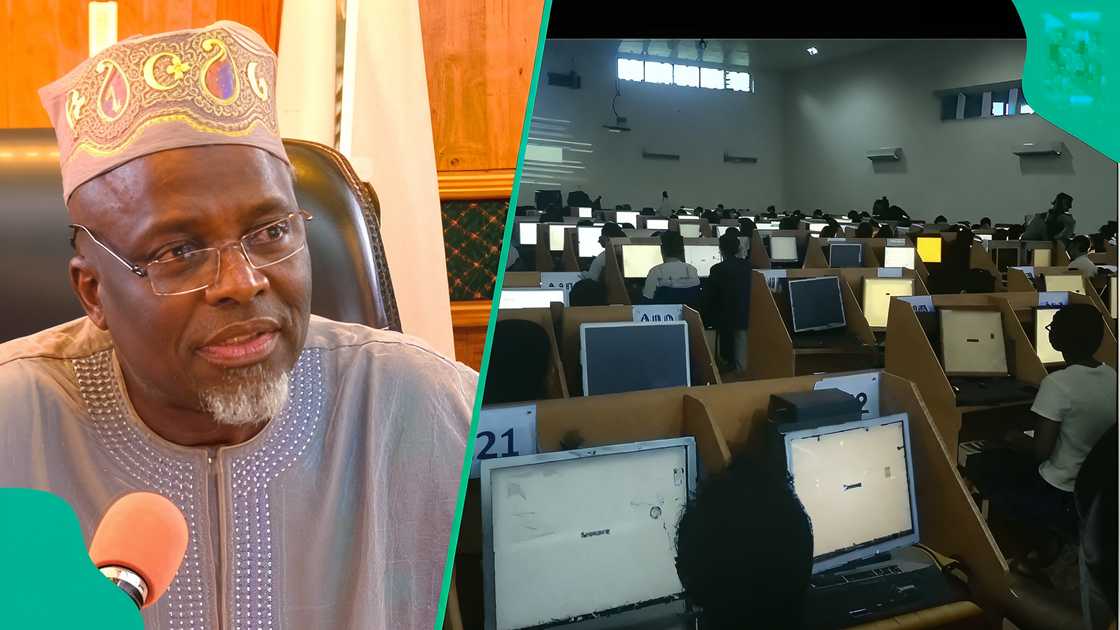A System in Shambles: Why JAMB Registrar’s Apology Isn’t Enough, by Folaranmi Ajayi
Editor’s note: In this piece, Folaranmi Ajayi, an education policy writer, dissects the fallout from the 2025 UTME mishap, urging deeper accountability, structural reforms, and stronger safeguards to prevent such large-scale disruptions in students’ academic journeys.
The recent emotional press briefing by the Registrar of the Joint Admissions and Matriculation Board (JAMB), Professor Ishaq Oloyede, has reignited critical conversations around accountability, technological infrastructure and the credibility of Nigeria’s examination system.

Source: Twitter
Professor Oloyede’s public admission of error, followed by visible tears, was both human and symbolic. In a system where denial, blame-shifting and bureaucratic deflection often dominate public responses, his decision to accept responsibility and apologise openly was uncommon and, frankly, courageous. However, beyond the tears lies a larger and more urgent question. How did a system trusted with the future of millions of young Nigerians fail so significantly?
According to the registrar, a total of 379,997 candidates will now have to retake the 2025 Unified Tertiary Matriculation Examination (UTME) due to a combination of human error and technology failure. Of that number, 206,610 are from Lagos, while 173,387 are from the southeast, spanning Imo, Abia, Ebonyi, Enugu and Anambra states. This revelation followed weeks of mounting complaints from candidates and parents who noticed anomalies in scores, technical glitches at CBT centres and alleged irregularities during and after the examination process.
The decision to order a resit for nearly 380,000 candidates is massive, arguably unprecedented in the history of standardised testing in Nigeria. While the Board must be credited for eventually confronting the issue head-on, the magnitude of the error raises serious concerns about internal quality control, centre supervision and contingency planning.
Why were the problems not flagged earlier? Why did it take public outcry and pressure for the Board to act? What does this say about JAMB’s capacity to deliver a seamless nationwide exam in a digital age?
As a student mentor and education policy writer, I find this deeply troubling. This is more than a technical glitch; it is a grave breach of public trust. Millions of Nigerian families invest emotionally, financially and psychologically in the UTME process. For many, this exam is not just a test but a ticket to social mobility and economic relevance. The affected candidates, many of whom are first-timers, are now burdened with the trauma of re-preparing, uncertainty about their timelines and the pain of reliving a process they thought had ended.
Beyond the moment of public apology, the Registrar must face the consequences of this institutional failure. While the gesture of crying and accepting blame was human, accountability must extend to official sanctions. JAMB is not a one-man show, but as the head of the agency, Professor Oloyede bears executive responsibility. A resignation, suspension, or at the very least, a disciplinary inquiry should be considered. Not as a witch-hunt, but as a statement that no one is above consequences in a system that values its integrity.
This failure has undoubtedly wounded the credibility of JAMB. The UTME has long been seen as the fairest of all entrance examinations in Nigeria: centralised, computer-based and merit-driven. However, this incident undermines that confidence. When close to 400,000 candidates are asked to rewrite an exam due to internal negligence, we must question whether JAMB’s systems are truly robust or merely performative. If these flaws go unpunished or uncorrected, they set a dangerous precedent for the future.
As someone who has studied policy in education and monitored national testing practices, I believe several urgent steps must now be taken to restore JAMB’s credibility and protect the dreams of young Nigerians:

Source: Twitter
- Independent Audit: JAMB must open itself to a full independent audit of the 2025 UTME, including technology vendors, centre accreditation processes and internal workflow. This will ensure transparency and help the public understand exactly what went wrong.
- Centre Reform and Accountability: CBT centres involved in malpractice or operational failure should be blacklisted, prosecuted where necessary and banned from future partnerships. A revalidation process must be introduced for all centres annually.
- Candidate Support Structures: Psychological and academic support should be offered to affected candidates. This includes extension of university application deadlines, access to free preparatory materials and waivers for reprint and logistical costs.
- Policy Reform: The Ministry of Education must initiate legislation that introduces a regulatory body or ombudsman to oversee examination bodies, ensuring checks and balances. An education accountability law is long overdue.
- Technology Upgrade and Real-Time Monitoring: JAMB must invest in smart, AI-powered surveillance and real-time analytics to detect anomalies as they occur. A feedback system for live reporting by students at centres should be institutionalised.
- Leadership Review and Performance Audit: A national conversation must be held about the culture of leadership in examination bodies. While Professor Oloyede has had commendable achievements, one mistake of this scale demands a performance review by the Federal Government.

Read also
Man who took part in JAMB result review shares what jappened to the vendor who caused errors
For the young Nigerians affected, this is more than a setback. It is a reminder of how fragile their future becomes in the hands of inefficient systems. Their resilience will be tested, but it should not be exploited. As the UTME reprint process begins, I urge every policymaker, education stakeholder and civil society organisation to speak up and demand better.
We owe our youth a system that works. A system that does not make them victims of incompetence. A system that respects their effort, their dreams and their potential.
This moment must not be swept under the rug. It should be a turning point, a moment of reckoning for how we treat education and the future of this nation.
If we cannot get a national exam right, what hope do we have for getting the nation right?
Folaranmi Ajayi is an educator, journalist, and education policy writer passionate about transforming Nigeria’s education sector.
Disclaimer: The views and opinions expressed here are those of the author and do not necessarily reflect the official policy or position of Legit.ng.
Source: Legit.ng




